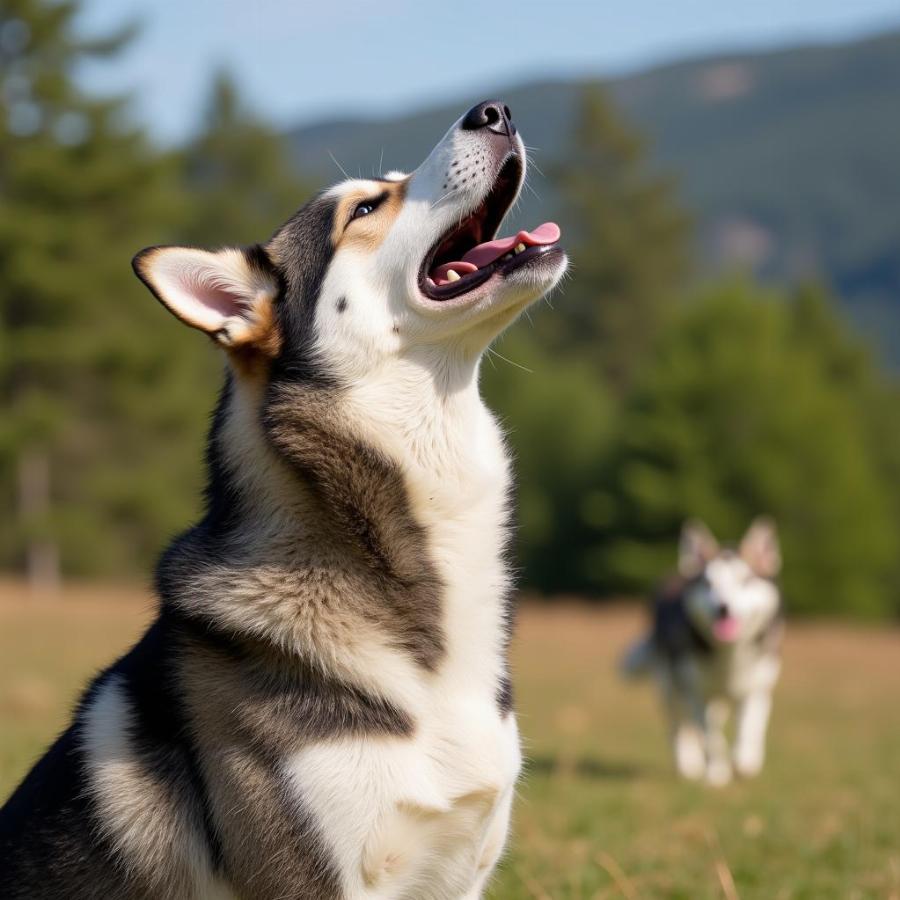Dog howling GIFs are everywhere online, capturing those hilarious and sometimes mystifying vocalizations our furry friends make. But have you ever wondered what those howls really mean? While a dog howling GIF might bring a smile to your face, understanding the reasons behind your dog’s howling can provide valuable insights into their emotional and physical well-being. This article dives into the world of canine communication, exploring the various reasons why dogs howl and what those howls might be trying to tell us.
Decoding the Howl: Why Do Dogs Howl?
Dogs, like their wolf ancestors, use howling as a form of communication. It’s not just random noise; there’s often a specific message behind each howl. From expressing loneliness to alerting the pack to danger, howling serves a multitude of purposes. Let’s explore some of the most common reasons:
- Communication and Connection: Dogs howl to communicate with other dogs, especially over long distances. This can be a way of locating pack members, announcing their presence, or coordinating activities. Think of it like a canine conference call!
- Territorial Defense: A howl can be a warning to other dogs to stay away from their territory. This is often triggered by sounds like sirens or other dogs barking. It’s their way of saying, “This is MY turf!”
- Anxiety and Distress: Dogs may howl due to separation anxiety, fear, or discomfort. This is particularly common in puppies or dogs new to an environment. They might howl to express their unease and seek reassurance.
- Medical Reasons: Sometimes, howling can be a sign of underlying medical conditions like pain or cognitive dysfunction. If your dog’s howling is sudden, excessive, or accompanied by other unusual behaviors, consult your veterinarian.
- Response to Stimuli: Certain high-pitched sounds, like musical instruments or emergency vehicle sirens, can trigger a howling response in some dogs. This is often an instinctive reaction.
 Adult Dog Using Howling to Communicate
Adult Dog Using Howling to Communicate
Understanding Your Dog’s Howls: Is It a Problem?
Howling isn’t necessarily a problem. For some breeds, like Huskies and hounds, howling is a natural and frequent behavior. However, excessive or inappropriate howling can be disruptive, especially for your neighbors.
When to Worry About Dog Howling
- Sudden Changes: If your typically quiet dog starts howling excessively, it could signal a change in their health or environment.
- Accompanying Symptoms: Howling paired with other behaviors like pacing, whining, or destructive chewing might indicate anxiety or pain.
- Distress Signals: Howls that sound distressed or pained warrant a veterinary checkup.
Addressing Excessive Howling: Tips and Techniques
If your dog’s howling is becoming a problem, there are steps you can take to address it:
- Identify the Trigger: Determine what’s causing the howling. Is it loneliness, boredom, or a specific sound?
- Behavioral Training: Teach your dog the “quiet” command. Reward them with treats and praise when they stop howling on command.
- Environmental Enrichment: Provide plenty of mental and physical stimulation. Bored dogs are more likely to howl.
- Desensitization: Gradually expose your dog to the triggers that cause howling, starting at a low intensity and rewarding calm behavior.
- Consult a Veterinarian: Rule out any underlying medical conditions and discuss potential behavioral modification techniques.
From Howls to Happy Tails: Building a Stronger Bond
Understanding your dog’s vocalizations, including their howls, can deepen your connection and enhance your ability to meet their needs. While a dog howling GIF might be entertaining, recognizing the underlying meaning can be even more rewarding.
FAQs About Dog Howling
- Why does my dog howl at sirens? This is often an instinctive reaction to high-pitched sounds, possibly related to their ancestral wolf instincts.
- Is howling a sign of aggression? Not necessarily. Howling is primarily a form of communication, but it can accompany territorial displays.
- How can I stop my dog from howling when I’m away? Address potential separation anxiety through training, crate training, and providing comfort items.
- Do all dogs howl? No. Some breeds are more prone to howling than others.
- Should I punish my dog for howling? Punishment is rarely effective and can worsen anxiety. Focus on positive reinforcement and addressing the underlying cause.
Expert Insight: Dr. Emily Carter, a certified veterinary behaviorist, says, “Howling is a normal canine behavior. It’s important to understand the context of the howl to determine if it’s a cause for concern. Addressing the underlying cause, rather than simply suppressing the behavior, is key.”
Expert Insight: Maria Sanchez, a professional dog trainer, adds, “Addressing excessive howling requires patience and consistency. Positive reinforcement methods and environmental enrichment are often the most effective approaches.”
Beaut Dogs is your one-stop resource for all things dog-related. From understanding dog howling GIFs to providing expert advice on canine care, we’re committed to helping you build a stronger bond with your furry friend. When cần hỗ trợ hãy liên hệ Email: [email protected] để được Beaut Dogs giải đáp chi tiết và chính xác. Visit https://beautdogs.com today to explore a world of canine knowledge and resources!